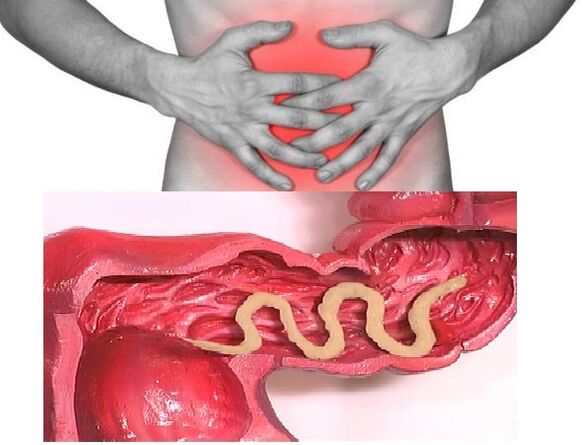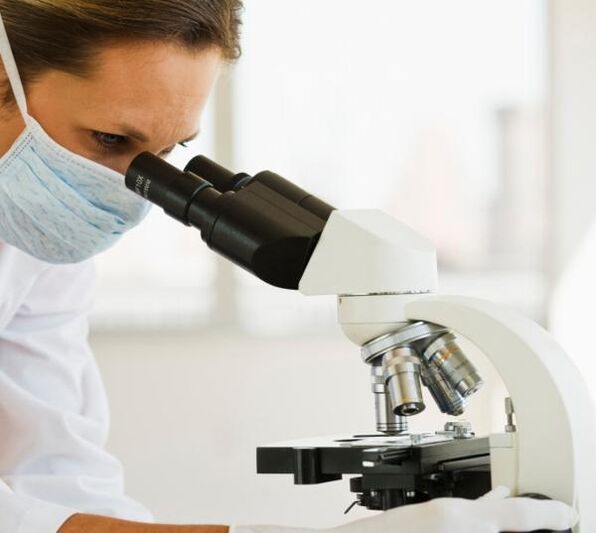Many do not even think about the presence of parasites in their body. In addition, often people do not even suspect that when there are health problems, the culprits for this condition are microorganisms that exist at the owner's expense.
Meanwhile, worms cause various helminthiasis (ascariasis, enterobiasis, echinococcosis, trichinosis, etc. ). Without deworming, a person develops a number of different complications.
Failure to treat helminth invasion in childhood can lead to a delay in mental and physical development. And the organs attacked by the worms contribute to the appearance of inflammation, which does not go away even after removing the parasites.
But how to determine the presence of parasites in the body at home? What symptoms and diseases accompany different types of helminthiasis?
What should you look for in identifying worms in humans?

Coarseness of the skin, the appearance of spots, acne, baldness and premature wrinkles - all these manifestations can indicate the presence of parasitic microorganisms. Problems with the nails or the formation of cracks in the heels (damage to the digestive organs) can also indicate helminthiasis, sometimes there is a connection between psoriasis and lamblia.
Often times, the above symptoms are caused by Lamblia or Trichomonas. However, any helminthic invasion negatively affects immunity.
This, in turn, leads to the appearance of such signs:
- Sinusitis;
- Angina;
- Polyps;
- Inflammation of the sinuses;
- sudden snoring.
To detect parasites in men, you need to pay attention to the presence of adenomas, cystitis, impotence, prostatitis, stones and sand in the kidneys and bladder. Some worms affect the brain and affect the development of future offspring.
To find out which parasites women have, the following symptoms will help:
- Myoma;
- painful sensations during menstruation;
- Fibroma;
- disorders in the menstrual cycle;
- Bladder and kidney disorders;
- fibrocystic breast disease;
- Inflammation of the ovaries.
With appendicitis, it is worth thinking about the presence of pinworms, biliary dyskinesia or pancreatitis, which indicate opisthorchiasis.
Ankylostomid larvae that invade the lungs often cause false pneumonia. In addition, the manifestations of some types of helminthiasis are similar to angina or bronchitis.
Also the symptoms of parasites in the human body are:
- Insomnia, constant malaise, and anemia;
- Weakening immunity;
- Avitaminosis;
- Gastrointestinal discomfort, constipation, dysbiosis;
- Weight changes;
- allergic reaction;
- Irritability and anxiety;
- Skin problems.
Symptoms of the presence of parasites in the body

To understand whether you or I have helminths, there are a number of signs that you should look out for, which vary widely. Typically, large worms contribute to constipation by blocking the biliary and intestinal ducts, which disrupts natural bowel movements.
A certain type of parasite secretes special substances that thin the feces. Therefore, diarrhea is not always a symptom of gastrointestinal disease, but often indicates the presence of parasitic microorganisms in the human body.
In addition, the parasitic microorganism causes flatulence and gas formation. This happens when helminths get into the small intestine and trigger an inflammatory process there.
Irritable bowel syndrome is another sign of helminth infestation. So, worms contribute to poor absorption of fat, as a result of which it enters the colon and therefore an increased amount is observed in the feces. This leads to cramps, diarrhea, and constipation.
Some types of worms can be found in muscle and synovial fluid. Therefore, their presence in these areas causes painful sensations that are similar to the symptoms of arthritis. In reality, this discomfort is due to inflammation, which is the immune response to the presence of worms.
Allergic manifestations are a characteristic feature of many types of helminthiasis. Ultimately, the toxins secreted by worms trigger an immune response that should produce many eosinophils. However, an excess of protective cells contributes to the occurrence of inflammation, which leads to allergies.
Often times, worms cause rashes, eczema, acne and other ailments. So, the simplest parasites lead to the formation of ulcers, papillomas and dermatitis.
The helminth invasion is almost always accompanied by anemia. This is because, after entering the intestine, worms attach themselves to its lining and suck nutrients out of the host's body. Trichomonas in particular, which feeds on blood cells, causes malaise, as a result of which there is significant blood loss.
People with helminthiasis often have weight problems. Obesity indicates that worms poison the human body with toxins or consume glucose. And excessive thinness indicates disorders in metabolic processes.

Due to the deterioration in well-being caused by the helminth invasion, the patient becomes too irritable and emotionally unstable. After all, the waste products of worms poison their host and negatively affect the nervous system, as a result of which the patient is in a depressed state.
Insomnia is a characteristic sign that parasites are active in the body. Therefore, if a person often wakes up at 2-3 a. m. , they need to contact a parasitologist, since it is at this point that the liver tries to remove all toxins. In addition, roundworms or pinworms leak through the anus at night, causing itching and irritation.
In patients under the age of 15, worms often cause teeth to grind while they sleep. This is how the nervous system reacts to the toxins excreted by the worms.
In addition, almost every helminthiasis is accompanied by chronic fatigue syndrome, which is characterized by impaired memory, apathy and the presence of flu-like symptoms. This signals a lack of nutrients that are eaten by pathogenic microorganisms.
With prolonged helminthic invasion, immune disorders appear in the patient's body. After all, the vital activity of worms greatly depletes the body's defenses, as a result of which allergic manifestations develop and create favorable conditions for the invasion of infections.
Prolonged parasitism of harmful microorganisms also damages organs and tissues, against the background oncological diseases develop. In this case, foci of inflammation form and the body experiences a lack of nutrients.
All of this is complemented by dysfunction of the immune system. This creates favorable conditions for the occurrence of various oncological diseases.
Certain types of worms are localized in the human respiratory system and cause inflammation in its organs. As a result, the following symptoms occur:
- runny nose;
- Temperature rise;
- To cough;
- Lung infection;
- Asthma.
How to recognize helminthiasis with medical research

If you have any of the above symptoms, you should consult a doctor to find out whether or not there are parasites in the body. You may need to see a parasitologist, infectious disease specialist, gastroenterologist, surgeon, sometimes an ENT specialist or an ophthalmologist, as it all depends on the location of the worms.
Often times, the diagnosis consists of scraping the stool and examining it for the presence of eggs. However, with such analyzes you can check whether worms live in the intestinal tract or whether parasites are migrating along it (tapeworms, flatworms, leeches).
Due to the fact that the eggs do not always come out of the anus, the study should be carried out 2-3 times. These diagnostic methods detect:
- Fluke;
- Whipworms;
- Tapeworms;
- Pinworms;
- Schistosomes;
- Roundworm;
- Trichinella;
- Hookworms.
Many types of helminths (leishmania, lamblia, trypanosomes, echinococcus, plasmodia, amoeba, toxoplasma) can be localized in almost all tissues and organs, which does not make the analysis of feces meaningful. In such a situation, the patient must do a blood test for the presence of immune enzymes, which will indicate the presence of antibodies and antigens.
In order to determine the parasite living in the host's liver, the removed material is probed and examined. If the helminth waste products are found in the human liver, this indicates an infection.



















